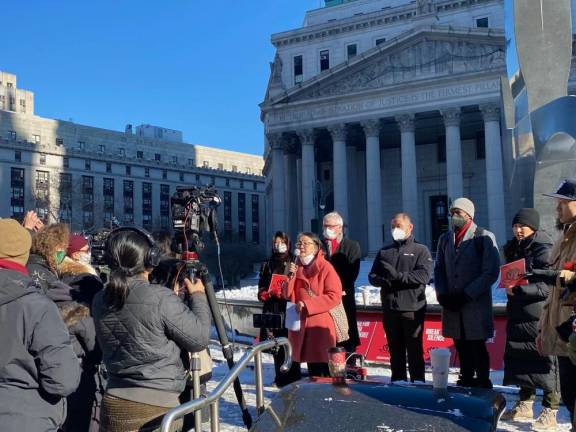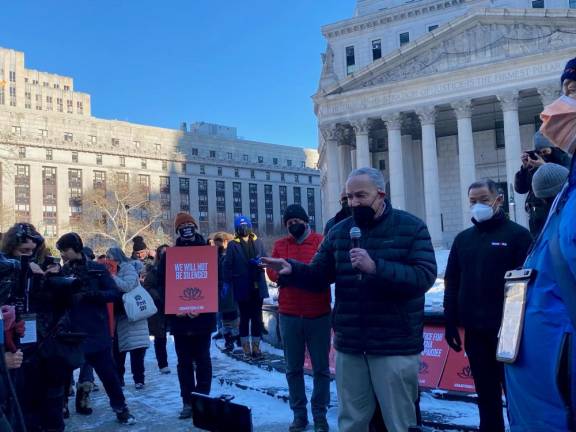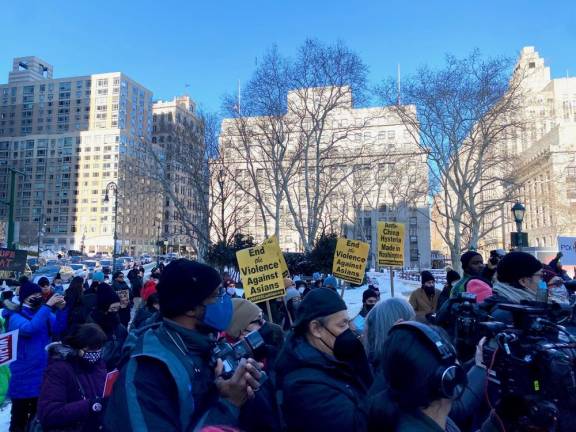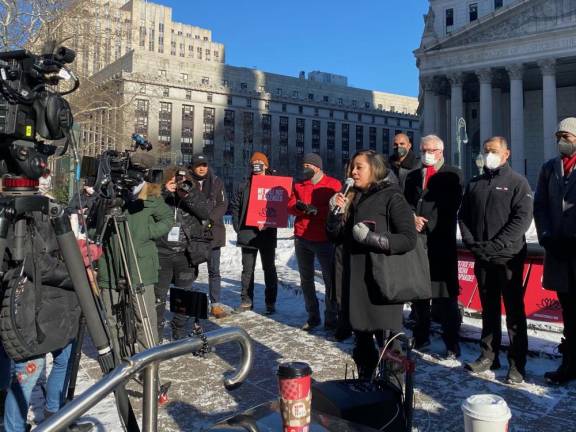A Rally for Asian Justice in Foley Square
Joining five other cities, New Yorkers show their support as anti-Asian hate crimes tripled in NYC
In sub-freezing temperatures, New Yorkers gathered in support of victims of anti-Asian hate crimes at last weekend’s Asian Justice Rally in Foley Square. Joined by participating cities San Francisco, Atlanta, Chicago, Los Angeles, and Philadelphia, Sunday’s rally observed a national moment of silence to commemorate recent hate crime victims Ee Lee, Shane Nguyen, Than Htwe, Younghee Choe, and more.
Officially titled “A National Day of Remembrance & Action,” the rally fell on the one-year anniversary of the death of Thai grandfather Vicha Ratanapakdee, the victim of an unprompted assault in a residential neighborhood in San Francisco. In honor of his passing, New Yorkers held signs that read “Not Your Model Minority” and “We Will Not Be Silenced.”
Speakers at the rally included Senator Chuck Schumer and State Senator John Liu, as well as family members of recent anti-Asian hate crime victims. “It’s not a time to be shy,” said Elizabeth Kari, daughter of assault survivor Vilma Kari. “It’s a time to come together to make sure people understand that this just isn’t a trend that’s appeared. It’s something that we’ve been living with together for many decades.”
According to data from the NYPD, anti-Asian hate crimes more than tripled last year, with all reported hate crimes in New York City totaling 503 in 2021, as opposed to 252 in 2020. Still, these numbers are underreported. In just the past two months, the city has seen several violent attacks. On January 15, Michelle Go was killed after being pushed onto the subway tracks at Times Square station. That followed the April assault and eventual death of Asian immigrant Yao Pan Ma in East Harlem on December 31, 2021, as well as the Bronx subway assault of a woman of Asian descent on December 1.
Despite being one month into 2022, Sunday’s rally was not the first NYC gathering of the year in commemoration of an anti-Asian hate victim, or even the second. The event followed January vigils for both Michelle Go and Yao Pan Ma.
“We need to work with elected leaders for legislation and funding to get safety programs on the ground and into our neighborhoods so our seniors feel safe again,” said Jo-Ann Yoo, Executive Director of the Asian American Federation. “Our safety depends on working together, refusing to be divided by gender, race, age, religion, sexual orientation, language and culture, and all the other classifications that potentially dehumanize our neighbors.”
Recent Legislation
The spike in hatefully motivated assaults since the start of the pandemic culminated in the COVID-19 Hate Crimes Act, which intends to expedite hate crime reviews and make reporting them more accessible. The legislation, which was passed in May of last year, was addressed by Schumer at Sunday’s rally.
“We have passed the anti-Asian hate crimes bill led by two Asian American women in the Senate: Mazie Hirono who is Japanese and Tammy Duckworth who is Thai, and now we will get the Justice Department,” he said. “We’re fighting to give them the dollars and the focus to prosecute every anti-Asian crime they’ve been ignoring for too long.”
More recently, Governor Kathy Hochul signed the Hate Crimes Analysis and Review Act, a bill to ensure that New York State thoroughly identify the demographic data of both hate crime victims and perpetrators, including but not limited to their racial, religious, sexual, gender and ethnic identities. With newly generated statistics made public, the state hopes to provide better support to victims and develop programming with an end goal of preventing future attacks.
Another New York State bill seeking solutions to ethnic and racial disparities recently joined over 200 cities in declaring racism a public health crisis. This legislation recognizes vast differences in infant mortality rates, quality of education, employment and housing as they relate to race nationally. The bill declares that “the impact of racism on public health deserves action from all levels of government,” and such has declared a “racial equity working group” within the Department of Health to investigate roots and occurrences of racism as it pertains to public health. Its goal is to develop legislative and other action-based recommendations for eliminating ethnic and racial disparities in New York State.
“It’s not one magic solution, we need the entire gamut of actions from community organizations to individuals such as yourselves,” said Liu as he addressed the crowd. “And to those of us in government, you hold us responsible because that’s what you put us in to do. To protect the community, to serve the community, and to make sure that Asian Americans have equal treatment, equal rights, and equal protection. That’s what this is all about.”
“It’s not a time to be shy, It’s a time to come together to make sure people understand that this just isn’t a trend that’s appeared.” Elizabeth Kari, daughter of assault survivor Vilma Kari



